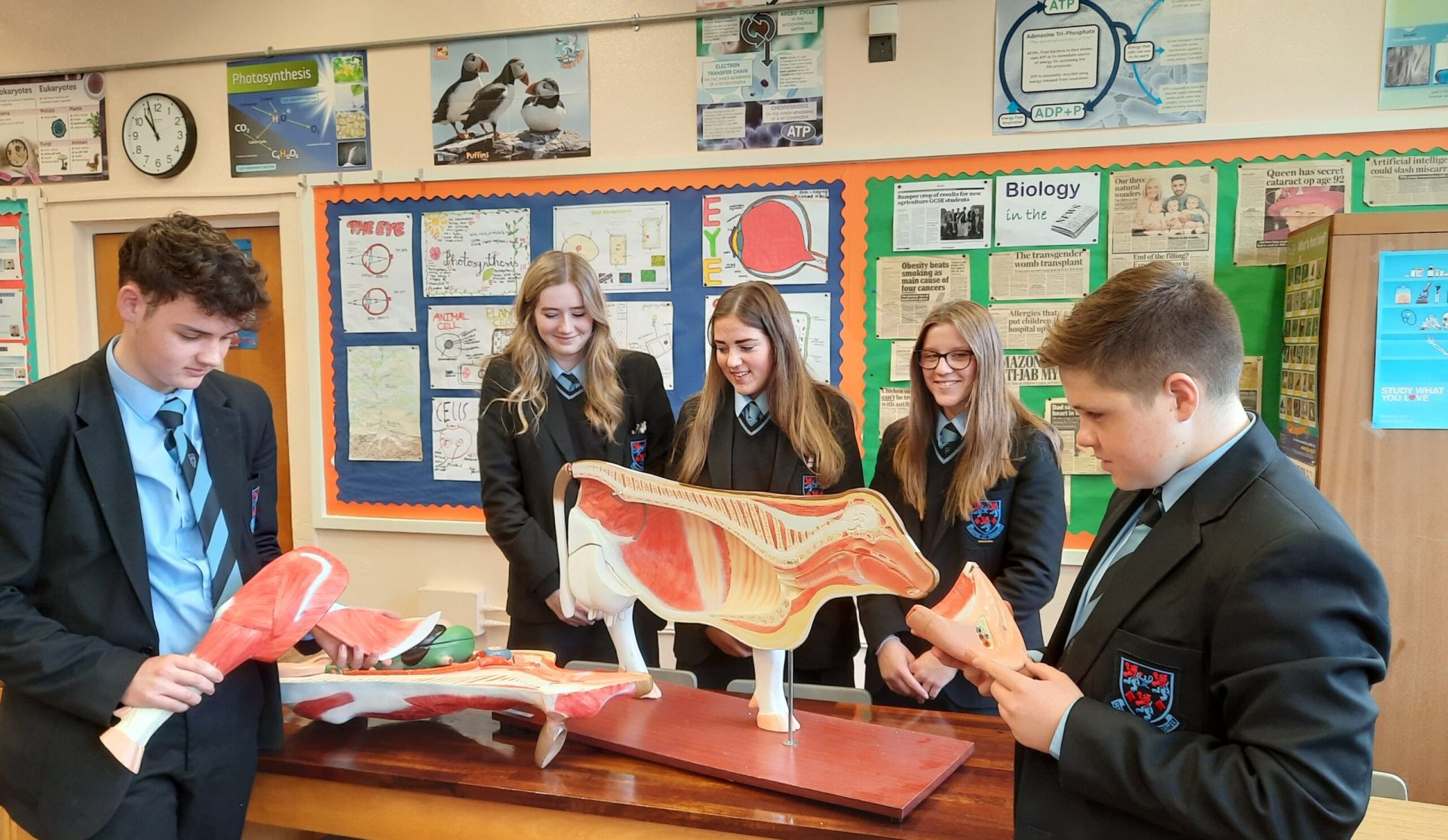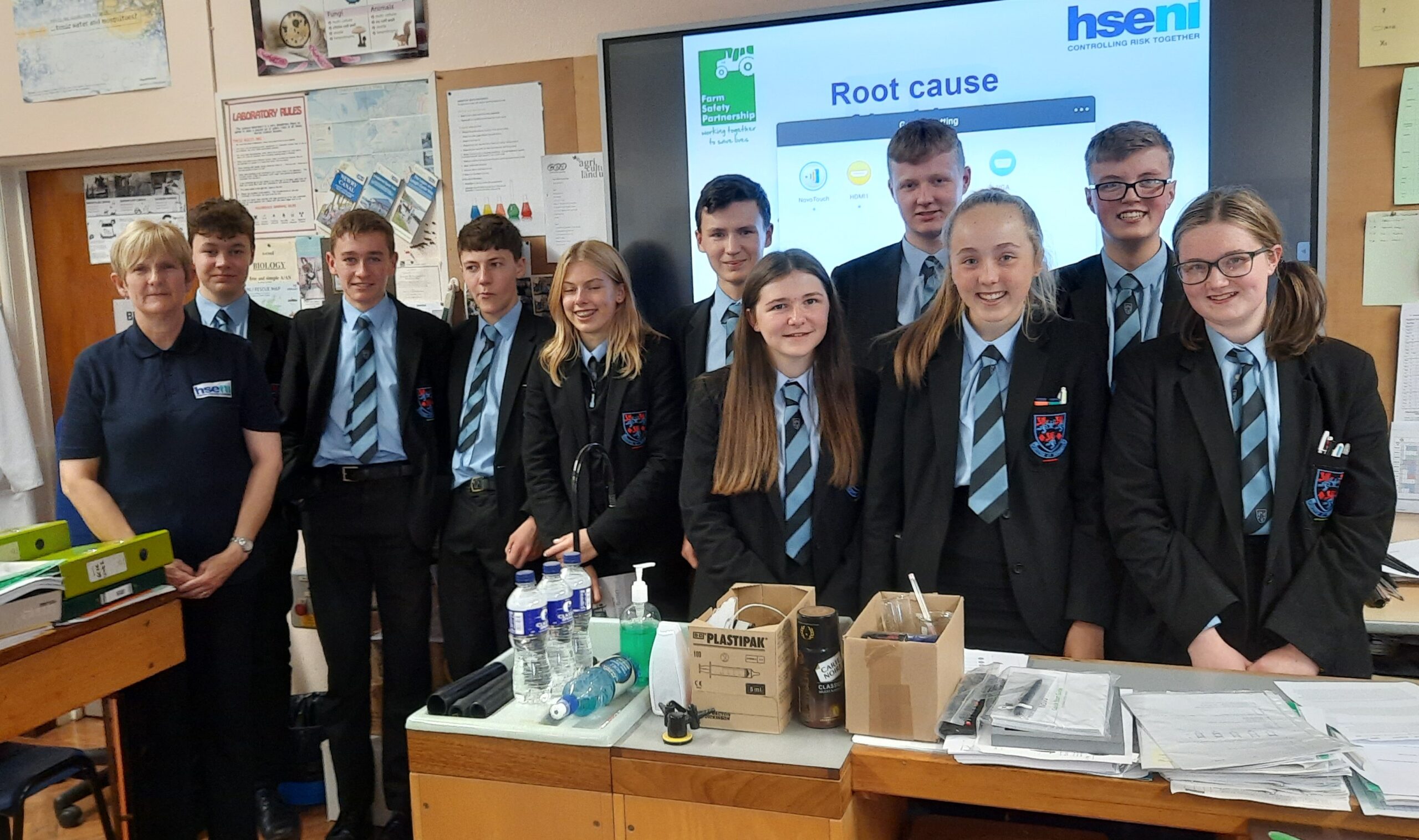Mr D Morris (Head Of Department)
Dr D Henderson
Mrs C Leeper
Mrs E Glynn
Mr S McDowell
Biology (subjects: Biology, Agriculture & Land Use)

The Biology Department’s Aim – to promote a positive, caring atmosphere in which individual self-discipline can develop an interest in Biology and it’s relevance to life.
Our staff are an enthusiastic and highly motivated team who are all experienced CCEA examiners at either GCSE, AS or A2 level. You will quickly become aware of the excellent staff/student relationships. This is all reflected in our excellent external examination results which are always well above the grammar school average at GCSE and A Level. At GCSE we offer CCEA Biology and CCEA Agriculture & Land Use
GCSE Biology
Examination Board: CCEA
What is GCSE Biology about?
Biology has the greatest factual content of the three sciences and involves a substantial mathematical component. It includes a study of Plant and Animal Biology along with ecology, genetics and micro-organisms. Students who are considering doing A Level Biology are strongly advised to take GCSE Chemistry.
What will I study and how will I be assessed?
| Content | Assessment | Weighting |
| Unit 1 Cells, Living Processes and Biodiversity | Written examination (1 hour 15 mins) | 35% |
| Unit 2 Body Systems, Genetics, Microorganisms and Health | Written examination (1 hour 30 mins) | 40% |
| Unit 3 Practical Assessment | Booklet A (7.5%) Two externally marked pre-release practicals in Year 12. Booklet B (17.5%) External written examination on practical work. (1 hour) | 25% |
What can this subject lead to?
Studying Biology at GCSE can lead to A Level which opens up a vast range of careers including medicine, dentistry, veterinary, agriculture, biosciences, ecology, forensics, genetics, marine biology, entomology etc.
GCSE Agriculture & Land Use
Examination Board: CCEA
What is GCSE Agriculture & Land Use about?
Agriculture & Land Use is designed to appeal not only to young people from the changing agricultural sector but also those who are interested in working within the wider land-based and environmental industries. This is an applied course which has been designed to motivate students to take charge of their own learning and to develop knowledge and practical skills in agriculture and other land use. It is designed for those who have an interest in Agriculture, Horticulture, Veterinary Science or other Land-Based careers. Those who do the course need to have a willingness to participate in Field Trips, handle small/farm animals and work with plants, soil and garden tools.
What will I study and how will I be assessed?
| Content | Assessment | Weighting |
| Unit 1 Soils, Crops and Habitats | External Examination | 25% |
| Unit 2 Animals on the Land | External Examination | 25% |
| Unit 3 Controlled Assessment | Controlled Assessment: – Planning and Investigation | 50% |
What can this subject lead to?
The Agri-Food industry contributes hugely to the local economy representing employment for around 50,000 people in farms, factories and the Agri-Food sector. Several prominent Agri-Food businesses are located in the Portadown area. It also develops skills necessary for A Level Science study.
A Level Biology (CCEA) Biology
Examination Board: CCEA
What is A Level Biology about?
An interesting detailed study of the intricacies of plants and animals along with microbes, genetics and ecology. Biology is a very relevant and inspiring subject, with a lot of factual information, enabling students to have an ability to understand complex processes, analysis, evaluation, problem solving and practical skills.
What will I study and how will I be assessed?
| AS Content | Assessment | Weighting |
| Unit 1 Molecules and Cells | External Examination | 37.5% of AS 15% of A Level |
| Unit 2 Organisms and Biodiversity | External Examination | 37.5% of AS 15% of A Level |
| Unit 3 AS Practical Skills | 1 hour External Examination (50 marks) and internal practical assessment (21 marks) | 25% of AS 10% of A Level |
| A2 Content | Assessment | Weighting |
| Unit 1 Physiology, Co-ordination and Control and Ecosystems | External Examination | 24% of A Level |
| Unit 2 Biochemistry, Genetics and Evolutionary Trends | External Examination
| 24% of A Level |
| Unit 3 A2 Practical Skills | 1 hour 15mins External Examination (60 marks) and internal practical assessment (15 marks) | 12% of A Level |
Are there any particular qualities or skills I should have to study this course and to what kind of careers can it lead?
A level Biology involves many calculations, use of statistics and an understanding and application of basic Chemistry.
Studying Biology at A Level opens up a vast range of careers including medicine, dentistry, veterinary, agriculture, biosciences, ecology, forensics, genetics, physiotherapy, nursing, research, marine biology, horticulture, entomology etc.
Entry Requirements
Students seeking to study AS Biology must have 315 uniform marks or above (a high grade B) in GCSE Biology or AA grade or above in GCSE Double Award Science, along with a minimum of a B grade in GCSE Mathematics. All GCSE units in these subjects must be taken at Higher Tier.
Where will Biology take me?
People will always require healthy food, new medicines, clean water, sensibly-produced crops, and fuel that is carbon neutral. Without a work force well trained in the biological sciences, none of this will happen.
Pursuing a career in biology is stimulating and rewarding. Whether you are an indoor or outdoor type, a solo performer or a team player, interested in plants, animals or people – there are options for everyone with an interest in biology, and rewarding career opportunities for those deciding to study biology at school or university.
Biology is one of the most useful subjects you can study at GCSE and A Level. It is essential for many careers like medicine and veterinary science and will also provide the necessary background to an extremely wide choice of other careers like psychology and sports science.
Below, some of our former students have provided details of their chosen career path since they left Portadown College after studying Biology to A-Level. Click on the names below to find out more:
- Jayne Anderson Biology Teacher
- Marc Beggs – Physiotherapist
- Nikki Graham – Investigating Officer, NI Ombudsman’s Office
- Ruth Kinkead – Research and Development Scientist
- Ian Kennedy – Pharmacist and Medicine
Where will Agriculture and Land Use take me?
Students studying the Agriculture and Land Use GCSE course are ideally placed for a career in the Agri-Food Industry. Locally more than 330 processing companies operate in the food and drinks sector, and several are based in the Craigavon area, eg. Moy Park, Wilson’s Country, Gilfresh, Tayto, etc. Last year 90% of food graduates secured employment or higher level study within 6 months of graduation, many with attractive salaries and excellent prospects. There is little doubt that Agriculture and Land Use is a growth area and good job opportunities exist. Food will not go out of fashion! Source DARD June 2012.
Food will never go out of fashion!!!



